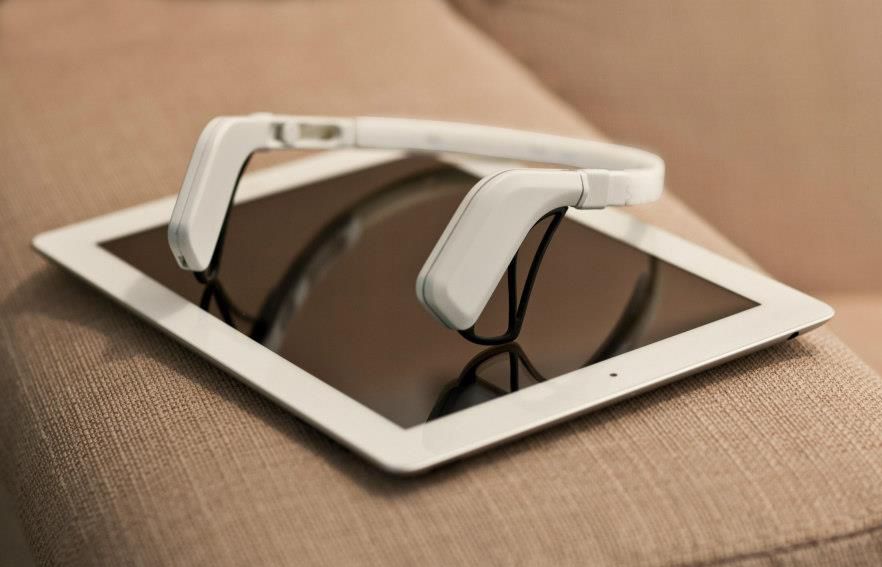
We all want healthy bodies and minds, but admittedly one is easier to obtain than the other. Eat right, hit the gym and you’ll be beach ready in no time. But training your brain is a little more complicated. To help improve brain function, motivation, relieve stress and even improve your emotional state, InteraXon has developed Muse, a brainwave-sensing headband intended to be used at home to help anyone train their mind. With a short exercise done once a day, the device senses brainwaves and tracks your progress so you can keep an eye on where and how your brain is improving.
While it sounds similar to the online games and tests meant to improve brain function, Muse is a little different. The device partners with an app that will allow you to train your brain to relax, focus and settle your mind. Done repeatedly over the course of several months the brain is supposed to learn how to calm and focus itself, allowing you to have greater control over your emotions, stress and concentration. Over time InterXon hopes this will take on more physical results such as lowering the risk of heart disease and reducing the possibility of a heart attack or illness.

A 2007 Harvard study found that “emotional vitality—a sense of enthusiasm, of hopefulness, of engagement in life, and the ability to face life’s stresses with emotional balance—appears to reduce the risk of coronary heart disease.” The study also showed that mental wellness or lack thereof had more of an impact on health than common “wholesome behaviors” such as daily exercise and not smoking. It’s this study that the idea for Muse was based on—to allow users to gradually gain the training and acuity needed to pull themselves out of an emotional or stressful situation and refocus their minds for better overall health.
InteraXon has been working with brain sensing technology for over a decade, conducting research in labs dedicated to computer engineering, wearable technology, neuroscience and prosthetics. They have partnered with the Government of Canada and the MaRS Discovery District, and worked with research labs at the Baycrest Centre for Geriatric Care, the University of Toronto, the Krembil Neuroscience Institute, the University of California San Diego and the Rotman Brain Institute, just to name a few. It’s fair to say they understand the electrical patterns in the brain. To make Muse work, they mobilize electroencephalography or EEG technology, and detect delta, theta, alpha, beta and gamma waves in the brain to measure the degree of distraction or relaxation.

Of course, while it may be able to easily detect brain waves, it’s another thing entirely to say that a device can actually train the brain. We decided to give Muse a go to see how well it focuses the brain, de-clutters the mind and gets rid of our stress—fingers crossed.
One of the best things about Muse is its easy-to-use interface. Despite its somewhat complex technology, it’s easy to set up and use right out of the box. Download the app onto your Apple device (the Android version will be available this summer) and their Calm app will walk you through a set up process that takes literally seconds. But before you can begin “training” you have to calibrate the device to your head. This took a little longer. The headband (which looks and feels like something out of Star Trek) rests around the ears and across the forehead, with extremely sensitive electronic detectors around the perimeter. And they are extremely sensitive. While the app will tell you which detector is not picking up your signal it takes a little trial and error to get all 7 detectors to work unanimously. This is probably the biggest downside to Muse, as once you finally get them picking up your brain signals you don’t want to move your head—don’t even breathe heavily. Once it’s adjusted the app will ask you a series of simple questions to finish calibration.

After you’re situated the program will begin. And we’ll confess with all this cool tech we thought there would be some heavy duty tasks to perform or math problems we haven’t seen since our high school calculus classes, but the only thing you have to work with is a beach. On the screen you’ll see a sunny ocean-side spot that you can control with your mind. When you’re focused and calm, the scenery is clear, the waves are still, and if you’re really getting Zen, birds will appear. But if you start to become stressed or lose focus the water becomes choppy, the wind howls and a storm begins to brew. By detecting variances in your brainwaves and translating them into an audio and visual experience you can actually control the weather in this virtual environment with your mind. It’s pretty cool.
Once your three minute session is over, the app will rate your experience and give you analytical data on how active or calm your brain was and for how long. Over time the information will give the program a better idea of how you’re improving and allow you to track your progress. The first few sessions might be a little harder than you imagine (our score was terrifyingly low), but it will get easier to control your mind and allow yourself to remain focused and calm. Soon you’ll feel like you can better refocus in stressful situations and even find it easier to unwind at the end of the day. We can’t say it’s entirely changed our lives, but we do find traffic just a bit less stressful—and that alone is worth it.
Muse is available online and priced at $299.









